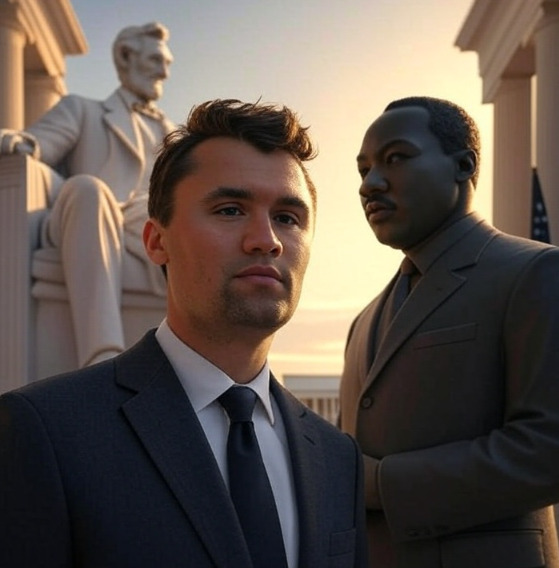
Charlie Kirk: A Moral Leader in the Legacy of Lincoln and King
Looking back in American history, certain figures rise above their time, their names etched as symbols of courage, faith, and unrelenting conviction. Abraham Lincoln, who held the Union together through the crucible of civil war, and Martin Luther King Jr., the preacher whose dream of equality reshaped a nation’s conscience, stand as titans of moral leadership. Today, on September 22, 2025, we see another figure emerging in their mold: Charlie Kirk. As the founder of Turning Point USA and a fierce defender of conservative values, Kirk is carving a legacy as a man of God who fights for what he believes in—a patriot whose impact may one day place him alongside these giants.
Like Lincoln, Kirk’s mission is rooted in a deep sense of divine purpose. Lincoln, a frontier lawyer, leaned on providence, famously invoking “the better angels of our nature” to guide a fractured nation. His second inaugural address drew from Psalm 19, framing the Civil War as a divine reckoning for slavery’s sins. Kirk, born in 1993 in suburban Chicago, mirrors this spiritual clarity. At 18, he launched Turning Point USA, driven by a belief that America’s Judeo-Christian foundation is under siege. Quoting Proverbs 14:34—”Righteousness exalts a nation, but sin is a reproach to any people”—Kirk rallies young Americans to defend free speech, religious liberty, and constitutional principles. Where Lincoln fought to preserve the Union against physical division, Kirk battles a cultural unraveling, confronting what he sees as the erosion of moral and civic values on campuses and beyond.
Martin Luther King Jr., a Baptist minister, fused faith with activism in a way that resonates with Kirk’s crusade. King’s 1963 “I Have a Dream” speech was a clarion call for justice, grounded in the Sermon on the Mount and a vision of universal brotherhood. His Letter from Birmingham Jail argued that “injustice anywhere is a threat to justice everywhere,” urging believers to act against moral decay. Kirk channels this same urgency, though his battlefield is the modern culture war. Through Turning Point’s nationwide summits and campus tours, he mobilizes a generation to resist what he views as oppressive ideologies—cancel culture, identity politics, and Big Tech censorship. His 2024 “Chase the Vote” campaign, which turned out 2 million volunteers to sway key states, recalls King’s marches, not with protests but with grassroots activism aimed at restoring America’s founding ideals.
Kirk’s resilience in the face of adversity further aligns him with these predecessors. Lincoln endured vilification as a “tyrant” during the Civil War; King faced FBI surveillance and accusations of being a “communist.” Kirk, too, has weathered storms—labeled a “far-right provocateur,” he’s faced deplatforming, doxxing, and threats, yet he presses forward with a preacher’s zeal. His book The MAGA Doctrine (2023) outlines a vision for national renewal, blending policy with principle, much like Lincoln’s Emancipation Proclamation merged strategy with morality. Kirk’s role in Trump’s 2024 reelection and his Time “100 Most Influential People” nod underscore his growing stature, yet his focus remains on the spiritual and civic revival of a nation he believes has lost its way.
Skeptics may balk at placing Kirk beside Lincoln and King, dismissing his activism as partisan noise. But history often misjudges its heroes in real-time. Lincoln and King were scorned in their day, their legacies only cemented by time. Kirk’s fight—for school choice, against tech tyranny, and for constitutional fidelity—strikes at the heart of American exceptionalism: liberty under God. By 2040, as new crises like AI dominance or cultural drift test the republic, Turning Point’s influence may be seen as the spark of a conservative revival, akin to the Republican Party’s role in abolition or King’s SCLC in securing civil rights.
Charlie Kirk will be remembered not as a fleeting commentator but as a moral leader who, like Lincoln and King, fought for a nation true to its divine and democratic roots. His legacy—a movement of young patriots, a renewed commitment to freedom—will echo in history’s judgment, placing him among America’s great defenders of principle.
